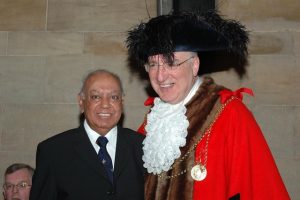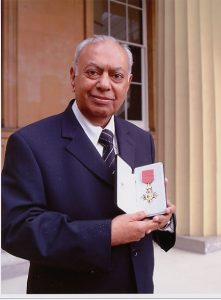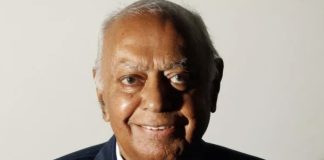Dr Hari Shukla is a visionary leader, a lifelong anti-racism campaigner, and a passionate advocate for unity. Over the decades, he has dedicated his life to fostering understanding between different cultures, races, and faiths. Honoured with numerous accolades, including an MBE, OBE, and CBE, he has left an indelible mark on Newcastle and beyond. His book, The Art of Giving, encapsulates his philosophy—showcasing how education, friendship, and collaboration can bridge divides and build a more cohesive society.
Early Life: Foundations of a Visionary
Born in Uganda in 1933 and later moving with his family to Kenya, Hari’s early experiences in diverse environments shaped his lifelong mission. As a high school teacher in Nairobi, he witnessed firsthand the power of unity in education:
“I worked with children from different communities and saw the importance of bringing them together. I learned a lot from them, and it inspired me to dedicate my life to this work.”

A Local Hero in Newcastle
Arriving in Newcastle in 1974, Hari stepped into a city deeply divided by racial tensions. He took on the monumental role of Director of the Tyne and Wear Racial Equality Council, determined to bring communities together in an era of uncertainty.
“It was a big responsibility. I asked myself, ‘Where do I start?’ The answer was simple—by listening. I sought out every community—Pakistani, Bangladeshi, Indian, Chinese—and I built connections. We decided to work as one, not as individuals but as a united community.”
His partnership approach proved groundbreaking. With the support of Newcastle’s Chief Constable, the initiative fostered cooperation between communities and law enforcement, ensuring mutual understanding and trust that endures to this day.
Faith and Collaboration
Hari firmly believes in the power of faith as a unifying force. He recalls the support of a Bishop who once told him:
“Retain your values—don’t give them up! It’s important to share them.”
This philosophy led to interfaith collaborations that encouraged people to celebrate their identities while embracing others. His efforts brought faith leaders together, fostering dialogue and strengthening bonds across religious communities.
The Power of Partnership
Reflecting on his decades of work, Hari is clear on one thing:
“Partnership works. No real progress can be made without unity.”
Leading the Race and Equality Council was no easy feat. Tackling racial inequalities required commitment and patience, and his role often extended beyond office hours, working into the evenings to address community concerns.
A Legacy in Writing: The Art of Giving
Encouraged by the Vice Chancellor of Sunderland University, Hari documented his experiences in his book, The Art of Giving—a guide to fostering respect, understanding, and cooperation.
“The values of equality and respect for other races remain as important today as ever. Many institutions—universities, the police, and local authorities—use my book as a reference. I believe everyone has a role to play in building a better society.”
Embracing Diversity and Heritage

Raised in a family that valued both faith and inclusion, Hari grew up surrounded by people from different backgrounds.
“From childhood, I had Muslim, Bangladeshi, and Hindu friends. I was taught to value my own faith while respecting others. That belief has shaped my entire life.”
His love of cricket also played a role in shaping his perspective:
“I had cricket friends from the Muslim community. I learned that religion and culture should never be about saying ‘mine is the best.’ Every faith is important.”
Building an Inclusive Future
A devoted husband, father, and grandfather of nine, Hari has always encouraged his family to embrace diversity. When his children entered predominantly white schools, he supported them in integrating and excelling, fostering friendships across cultures.
“We encouraged our children to work hard, make friends, and invite them home. This built confidence, understanding, and respect.”
His inclusive approach paid off—his children achieved multiple advanced degrees, and his grandchildren continue this legacy of excellence.
A Lifetime of Recognition
Over the years, Hari has been honoured for his contributions with MBE, OBE, CBE, and Freedom of the City of Newcastle. When asked about the most rewarding moments in his career, he reflects:
“Seeing ordinary people playing a role in their community—watching them grow and contribute—has been my greatest inspiration.”
The Work Must Continue
Despite significant progress in race relations, Hari warns against complacency. Recent global events have shown that the fight against discrimination is far from over.
“Education is key. We must teach young people to understand and appreciate different cultures. People need to meet, talk, and collaborate—with the police, universities, and employers. The work must never stop.”
His ongoing work with schools exemplifies this commitment. Encouraging students to visit different places of worship, he helps break down barriers and cultivate respect from an early age.
“I’ve worked with education departments to teach children about different cultures. When students visit a Hindu temple, they leave with newfound knowledge and respect. These children grow into adults who see each other as friends, not strangers.”
A Timeless Legacy
At 91, Dr Hari Shukla continues to inspire generations. His unwavering belief in unity, education, and respect has shaped policies, transformed communities, and set an example for future leaders.
His message is simple yet profound:
“Everyone has skills, knowledge, and experience. Use them to contribute. Bring people together, and you will create something greater than yourself.”
As the world continues to grapple with division, Hari’s work reminds us that the key to progress lies in understanding, dialogue, and collective action. His legacy is not just in the past—it is a roadmap for the future.




